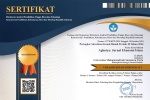Pengaruh Reward dan Punishment terhadap Produktivitas Kerja Karyawan di PT. Bank Muamalat KCP Stabat
Abstract
The purpose of this study is to determine the effect of reward and punishment on employee work productivity at Bank Muamalat KCP Stabat and find out how to increase employee work productivity at Bank Muamalat KCP Stabat. The data used in this study is data from the results of questionnaire answers given to BSI Pangkalan Brandan customers. This study used a simple linear regression analysis method using the SPSS computer program version 22.00 and Microsoft Excel 2007. The results showed that both partially and simultaneously the free variables studied, namely reward (X1) and punishment (X2) had a significant effect on the work productivity (Y) of PT employees. Bank Muamalat KCP Stabat. Reward (X1) and Punishment (X2) Work Productivity (Y) of PT. Bank Muamalat amounted to 83.4%, while the remaining 16.6% (100% - 83.4%) was influenced by other variables. Reward and Punishment have a positive direction towards the work productivity of PT. Bank Muamalat KCP Stabat. This means that the greater the compensation given and the better and more comfortable the work environment, the more it will increase the work productivity of PT employees. Bank Muamalat KCP Stabat. Vice versa, if the rewards given are less and the punishments given are not appropriate, it will reduce the work productivity of PT employees. Bank Muamalat KCP Stabat.
Full Text:
PDFReferences
Ahmad, Ayus dan Abdul Aziz. 2010. Manajemen operasional Bank Syariah. Cirebon: STAIN Press.
Antoni. Ahmad K. Muda. 2012. Kamus Lengkap Ekonomi. Jakarta: Gitamedia Press.
Ehols, John M. dan Hassan Sadily. 2010. Kamus inggris Indonesia. Jakarta: PT. Gramedia Pustaka Utama.
H. Undang Ahmad Kamaludin dan Muhammad Alfan. 2010. Etika Manajemen Islam. Bandung: CV. Pustaka Setia.
Karim, Adiwarman. 2011. Islam dan Analisis Keuangan. Jakarta: Gema Insani Press.
Kasmir. 2010. Bank dan Lembaga Keuangan lainnya. Jakarta: PT. Raja Grafindo Persada.
Margin, Frans Suseno. 2017. 13 Tokoh Etika. Yogyakarta: Kanisius.
Muhammad. 2016. Dasar-dasar Manajemen Bank Syariah Edisi Revisi. Yogyakarta:UII Pres.
Muhammad. 2011. Manajemen Bank Syariah. Edisi Revisi ke-2. Yogyakarta: UPP STIM YKPN.
M. Quraish Shihab. 2010. Tafsir Al-Misbah. Jakarta: Lentera Hati.
Nurnasrina. 2012. Perbankan Syariah I. Pekanbaru: Suska Press.
Pramiyanti, Alila. 2018. Study Kelayakan Bisnis untuk UKM. Yogyakarta: Media Persindi.
Thoha, Mifta. 2014. Perilaku Organisasi Konsep Dasar dan Aplikasinya. Jakarta:Raja Grafindo Persada.
T.Guritno. 26. 2015. Kamus Perbankan dan Bisnis. Yogyakarta: UGM Press
Undang-Undang Perbankan No. 10 Tahun 1998
Umam, Khaerul. 2013. Manajemen Perbankan Syariah. Bandung: CV. Pustaka Setia.
DOI: https://doi.org/10.30596/aghniya.v5i1.15409
Refbacks
- There are currently no refbacks.
Aghniya: Jurnal Ekonomi Islam is licensed under a Creative Commons Attribution-ShareAlike 4.0 International License.
Aghniya: Jurnal Ekonomi Islam
Faculty of Islamic Religion,Universitas Muhammadiyah Sumatera Utara. Address: Kampus Utama Jl. Kapten Muchtar Basri No.3, Glugur Darat II,Medan Sumatera Utara-20238.
E-mail: aghniya@umsu.ac.id





